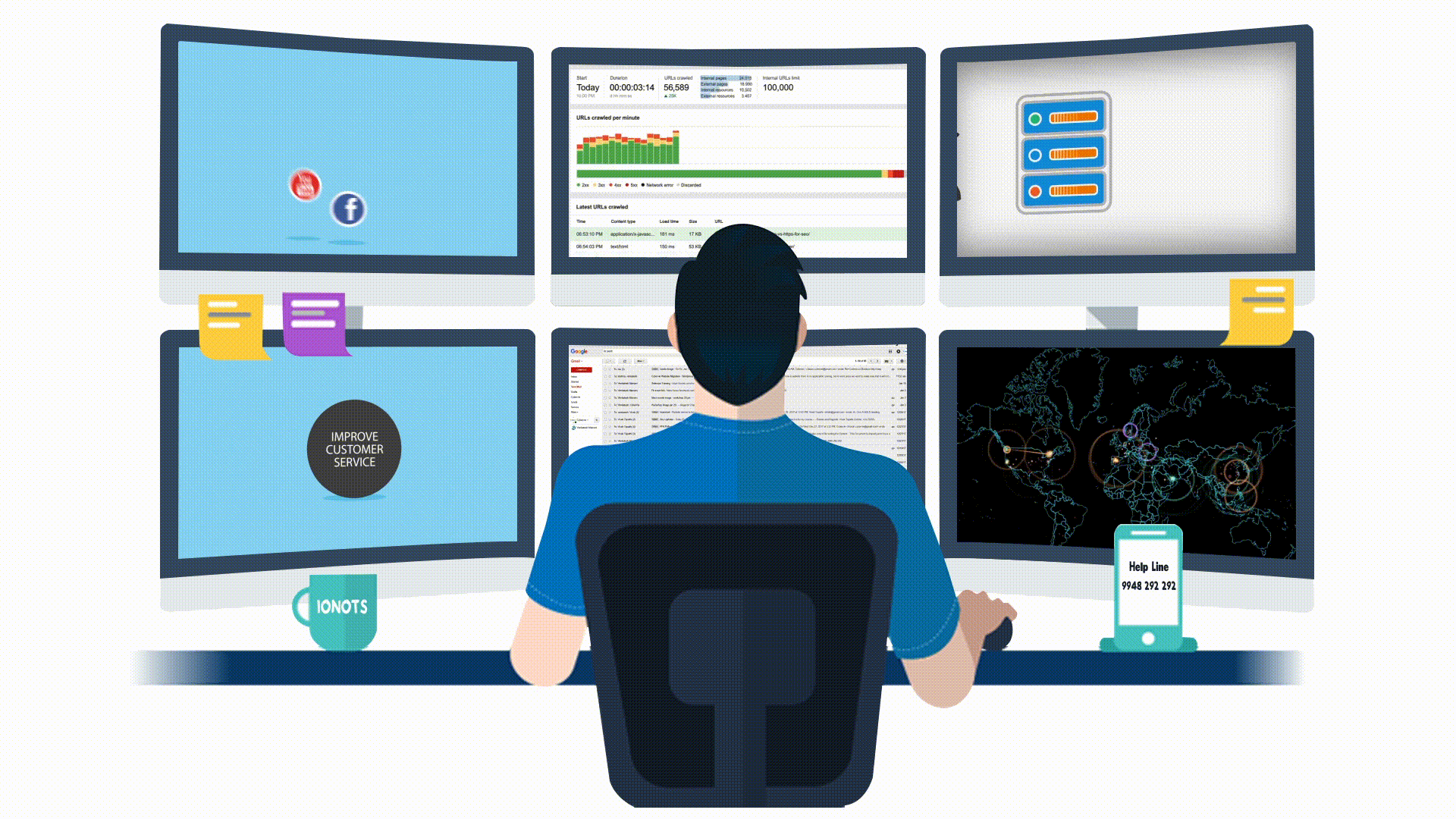Last Updated on November 15, 2023 by Symple IT Solutions
“Are you ready for the next wave of technological evolution?” This is a question that any forward-thinking business leader should be asking. As technology continues to advance at an unprecedented pace, future-proofing your IT infrastructure is not just a luxury; it’s a necessity. With insights from managed IT service experts, let’s dive deep into how you can prepare and adapt your IT infrastructure for future technological shifts
Future-Proof Your IT Infrastructure in Ottawa
Key Takeaways
- Understanding the importance of future-proofing IT infrastructure.
- Insights from managed IT service experts from Ottawa IT Support on staying ahead of technological shifts.
- Strategies for adapting IT infrastructures for future challenges.
The Imperative of Future-Proofing IT Infrastructure
What Does Future-Proofing Really Mean?
Future-proofing IT infrastructure involves preparing your network, hardware, software, and processes to handle upcoming technological advancements and challenges. This proactive approach is essential to maintain competitiveness and efficiency in a rapidly changing digital landscape.
The Role of Managed IT Expertise
Managed IT service experts play a crucial role in future-proofing strategies. Their experience and foresight in technology trends enable businesses to stay ahead of the curve, ensuring that their IT infrastructure is robust, scalable, and adaptable.
Insights from Industry Thought Leaders
Embracing Scalability and Flexibility
A key insight from experts is the importance of scalability and flexibility in IT infrastructure. This means designing systems that can grow and adapt to changing business needs without requiring complete overhauls.
The Power of Cloud Computing
Cloud computing is a cornerstone of modern IT infrastructure. Managed IT professionals often recommend leveraging cloud services for their scalability, cost-effectiveness, and ability to integrate new technologies seamlessly.
Cybersecurity as a Priority
As technology advances, so do cyber threats. Future-proofing isn’t just about adopting new technologies but also about enhancing security measures to protect against evolving cyber risks.
Strategies for Adapting IT Infrastructure
Regular Technology Audits
Conducting regular technology audits is vital. These assessments help identify areas needing upgrades or improvements, ensuring that the infrastructure remains up-to-date and efficient.
Investing in Training and Development
A future-ready IT infrastructure requires a skilled workforce. Investing in IT services Ottawa alongwith ongoing training and development for IT staff ensures they are equipped to manage and leverage new technologies effectively.
Building a Culture of Innovation
Fostering a culture of innovation within the organization encourages continuous improvement and adaptability in IT practices, making it easier to integrate new technologies as they emerge.
Preparing for Specific Future Trends
The Rise of Artificial Intelligence
AI and machine learning are increasingly becoming part of IT infrastructures. Businesses should prepare for the integration of these technologies to enhance automation, data analysis, and decision-making processes.
The Internet of Things (IoT) Integration
The IoT is connecting more devices than ever. Preparing IT infrastructure to manage and secure a growing network of IoT devices is crucial.
5G and Enhanced Connectivity
The rollout of 5G technology promises faster and more reliable internet connectivity, which will have significant implications for IT infrastructure, especially in terms of data transfer and processing speeds.
Emerging Technologies and Their Impact on IT Infrastructure
Blockchain Technology: A Game-Changer for Data Security
Blockchain technology is set to redefine how we approach data security in IT infrastructures. Its unique attributes make it an attractive solution for a range of security challenges:
- Decentralization and Security: Blockchain’s decentralized nature means that data isn’t stored in a single location, drastically reducing the risk of centralized data breaches. Each block in the chain offers a secure and tamper-proof record, enhancing the overall security of the system.
- Enhanced Transparency and Traceability: The transparency inherent in blockchain technology is ideal for auditing and tracking data changes over time. This can be especially beneficial for industries requiring stringent data tracking, such as healthcare or finance.
- Smart Contracts for Automated Compliance: Smart contracts in blockchain can automatically enforce and verify compliance with various regulatory requirements, reducing the burden on IT staff and minimizing human error.
Quantum Computing: The Future of Data Processing and Encryption
Quantum computing, although still in its nascent stages, promises to revolutionize IT infrastructure, particularly in the realms of data processing and encryption:
- Unprecedented Processing Power: Quantum computers can process complex problems much faster than traditional computers. This capability could lead to significant advancements in areas like machine learning, big data analysis, and complex simulations.
- Redefining Encryption: Quantum computing poses new challenges for current encryption methods, as it has the potential to break many of the cryptographic systems currently in use. This necessitates the development of quantum-resistant encryption methods to safeguard data.
- Quantum Key Distribution (QKD): This emerging technology uses quantum mechanics to secure communication, ensuring that any attempt at eavesdropping can be quickly detected. Implementing QKD in IT infrastructures could provide an unprecedented level of data security.
Vendor Management in Future-Proofing
In the rapidly evolving landscape of Ottawa IT infrastructure, the role of vendor management becomes increasingly critical. Selecting the right partners and maintaining effective relationships with them can significantly impact the success of your future-proofing efforts.
Choosing the Right Partners
- Alignment with Business Goals: Select vendors whose products and services align with your long-term business objectives. Ensure they have a track record of adapting to technological changes and can offer solutions that scale with your growth.
- Technological Expertise: Evaluate potential vendors based on their expertise in emerging technologies. Partners with a strong focus on innovation can provide insights and solutions that keep you ahead of the curve.
- Security and Compliance Standards: Given the importance of data security, choose vendors who adhere to high-security standards and are compliant with relevant regulations. This is crucial in protecting your infrastructure from security threats and regulatory risks.
- Reputation and Reliability: Research the vendor’s reputation in the market. Look for reviews, case studies, and testimonials from other clients to gauge their reliability and customer service quality.
- Support and Service Level Agreements (SLAs): Ensure that the vendors offer robust support and clear SLAs. Effective support can drastically reduce downtime and ensure your infrastructure operates smoothly.
Vendor Relationship Management
- Clear Communication: Establish clear lines of communication. Regular updates, meetings, and reports can help both parties stay aligned on goals and expectations.
- Collaborative Approach: Treat vendors as strategic partners rather than just service providers. A collaborative approach fosters innovation and allows both parties to work towards common goals.
- Performance Monitoring: Regularly review and monitor the vendor’s performance against agreed-upon metrics and SLAs. This helps in identifying areas of improvement and ensuring that the vendor continues to meet your evolving needs.
- Feedback Mechanisms: Implement a system for providing and receiving feedback. Constructive feedback can help vendors improve their services and adapt to your changing requirements.
- Long-Term Relationship Building: Focus on building long-term relationships with vendors. Long-term partnerships can lead to better service, understanding of your business, and more favorable terms.
Effective vendor management is a critical component of future-proofing your IT infrastructure. By carefully selecting the right partners and fostering strong, collaborative relationships with them, you can ensure that your IT infrastructure remains resilient, adaptable, and ready for future technological advancements.
IT Infrastructure Ottawa – FAQs
Q: How often should technology audits be conducted?
A: Ideally, technology audits should be conducted annually or bi-annually to keep pace with rapid technological changes.
Q: Can small businesses afford to future-proof their IT infrastructure?
A: Absolutely. Future-proofing is scalable. Managed IT service providers can offer tailored solutions that fit the budget and needs of small businesses.
Q: Is cloud computing secure enough for sensitive data?
A: Yes, when properly managed. Cloud providers invest heavily in security measures. However, businesses should also implement their own security protocols to safeguard data.
In conclusion, future-proofing your IT infrastructure is an ongoing process that requires strategic planning, expert insights, and a willingness to embrace new technologies. By staying informed and adaptable, businesses can ensure that their IT infrastructure not only meets current needs but is also prepared for future challenges and opportunities.
REFERENCES FOR FURTHER READING
For additional insights and deeper understanding of the topic “Ottawa IT Infrastructure,” the following high-authority websites and resources are recommended. These sources are renowned for their expertise and thought leadership in the field of IT, technology trends, and managed IT services:
- TechCrunch – TechCrunch.com
- TechCrunch is a leading technology media property, dedicated to obsessively profiling startups, reviewing new Internet products, and breaking tech news. It provides up-to-date information on technology trends and innovations.
- CIO.com – CIO.com
- CIO.com delivers the latest news, analysis, video, blogs, tips, and research for techies and IT professionals. It is particularly useful for insights into IT strategy and leadership.
- Gartner Research – Gartner.com
- Gartner is a global research and advisory firm providing information, advice, and tools for leaders in IT. Their research articles and reports are invaluable for understanding future IT trends and strategies.
- Forbes Technology Council – Forbes.com
- Forbes Technology Council is an invitation-only community for world-class CIOs, CTOs, and technology executives. The articles here often include insights from industry leaders on IT infrastructure and technology.
- MIT Technology Review – TechnologyReview.com
- MIT Technology Review provides an intelligent, lucid, and authoritative filter for the overwhelming flood of information about technology. It offers deep insights into technological advancements and their impact on IT infrastructure.
- Harvard Business Review – Technology – HBR.org
- Harvard Business Review offers a range of articles, podcasts, and videos on the latest in technology. It’s a great resource for understanding the intersection of technology and business strategy.
- IEEE Spectrum – Spectrum.IEEE.org
- IEEE Spectrum is the flagship magazine and website of the IEEE, the world’s largest professional organization devoted to engineering and the applied sciences. It covers a wide range of technology news, including IT infrastructure developments.
- Network World – NetworkWorld.com
- Network World provides news, trend analysis, product testing and the industry’s most important blogs, all collected at the most popular network watering hole on the Internet. It’s especially useful for networking aspects of IT infrastructure.



